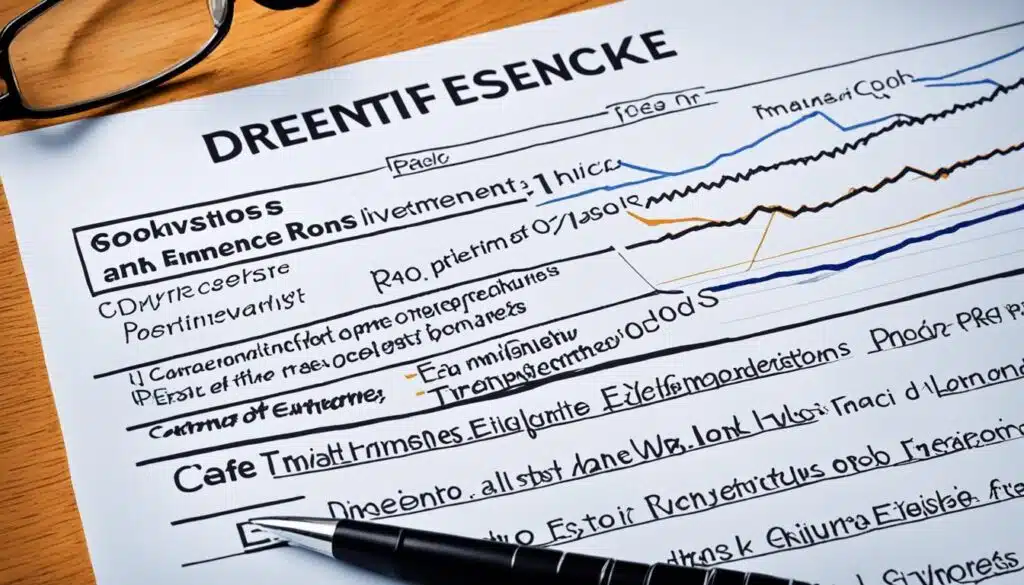Investing Money First off, investing isn’t scary. You just need the internet and some extra money. Forget the fancy words. Investing is simple: you buy stuff you think will be worth more later. Everyone wants more money, right? Investing can help you get there. But remember, you might lose some money too. You can invest in a lot of things, like land or shares in companies. Shares are part ownership in a company, bonds are like loans, and funds are investments managed by professionals.
Key Takeaways
- Investing is a relatively simple concept of buying something to sell it for a higher price in the
- future.
- Investing can help you achieve your financial goals, but it also carries the risk of losing money.
- The most common types of investments are shares, bonds, and funds.
- Patience and research are crucial when investing to minimise risks and maximise returns.
- Diversification is an important strategy to spread your investment risk.
Understanding Investing
Investing lets people make their money grow over time. It’s key for reaching big dreams like getting rich, having a comfy retirement, or growing extra cash. Learning the basics of investing is vital.
What is Investing?
Put simply, investing is using money to make more money. This can happen by getting paid back from shares, making profits in the stock market, or earning interest. Spreading investments around can lower the risk and boost earnings in the long run.
The Concept of Investing
Investing means carefully using cash to expect more in return. People have different ways to do this, whether by holding onto investments for a long time or trading more often. The aim is to use compound interest and regular investing to grow your money.
Goals Requiring Investment
Investments can help in many areas, from planning for retirement to managing everyday finances. By choosing where to put their money, investors can aim for specific goals and improve their money know-how.
Also Read : What Are The Best Strategies For Real Estate Investing?
Common Investment Types

There are several common types of investments, each with unique features and rewards. The main categories are shares, bonds, and funds.
Shares
Buying shares means owning a part of a company. Companies sell shares to get money for growing their business. As a shareholder, you can freely trade your shares on the stock market. The value of shares can change based on how well the company does, offering chances for increased capital.
Bonds
With bonds, you’re lending to a government or a company. They promise to pay you back the money, plus regular interest. Bonds are often seen as safer than shares because they offer a stable income. Yet, they might not grow in value as much.
Funds
Funds let you hand over the job of picking investments to professionals. These funds gather money from many people to buy various assets. This mix helps lower the risk of one investment dragging down your whole portfolio.
It’s key to know each type’s risks and rewards before investing. Doing your homework and matching your strategy with your goals and tolerance for risk are vital for success over time.
Also Read : How Do I Create A Personalized Financial Plan?
Ways Investments Earn Money
Most investments make money through Appreciation, Dividends, and Interest Payments. Knowing these methods helps you understand the investment world. It lets you match your plan with what you want financially.
Appreciation
Investments can go up (appreciate) or down (depreciate) in value. If you buy something hoping to sell it for more in the future, that profit is called a capital gain. This is a key way investments can increase your wealth over time.
Dividends
Companies may share a bit of their profits with investors through Dividends. These are usually paid out twice a year. Getting these cash payments can boost the money you make from your investments.
Interest Payments
When you borrow, you pay back the loan plus an extra fee, the Interest. With bonds, you’re the lender. You get interest payments from the government or a company until your bond is paid back.
| Investment Type | How it Earns Money | Example |
|---|---|---|
| Shares | Appreciation, Dividends | You buy shares in a company that increases in value over time. You also get dividends from its profits. |
| Bonds | Interest Payments | You buy a bond from a government or company. They pay you interest until the bond matures. |
| Funds | Appreciation, Dividends, Interest | You put money in a fund that has various shares, bonds, and assets. It aims to grow your money and provide income. |
Knowing how investments make money helps you choose the right ones for you. It helps match your goals with the level of risk you’re willing to take.
Also Read : These 50 Photos Of Unique People Show That Genetics Is Hard To Forget
Investing vs Saving
If you’re saving some of your money or have extra cash, think about investing. Usually, the inflation rate is higher than what savings accounts give you. This means putting your money in a savings account might actually lose value over the years.
Let’s say you put £5,000 into an investment over 10 years. Imagine your friend Lisa puts the same amount in a savings account. Lisa gets 1% interest per year, so after a decade, she has £5,525.62, while you grow your £5,000 investment to £8,144.47 at a 5% annual return. Now, think about the inflation impact. The Bank of England says goods and services got 3.1% more expensive each year from 2009 to 2019. To have the same buying power of your £5,000 from a decade ago, you’d need £6,757.41 today. Lisa’s money hasn’t decreased, but what she can buy is less. In contrast, you made a better profit.
| Investor | Initial Investment | Annual Interest/Return | Value After 10 Years | Impact of Inflation |
|---|---|---|---|---|
| Lisa (Savings Account) | £5,000 | 1% | £5,525.62 | £6,757.41 |
| You (Investments) | £5,000 | 5% | £8,144.47 | £6,757.41 |
The chances for a bigger profit are higher with investing, but it also means more risk. While your money is safe if your bank fails, up to £85,000 is protected by the FSCS. There’s no such safety net for investments.
Risks of Investing

Investing can lead to bigger rewards but also brings risks. If a bank fails, up to £85,000 is safe due to the Financial Services Compensation Scheme. However, investing does not provide such safety nets.
No Guarantees
Choosing the right investments and strategy is crucial. Placing everything in one risky area, aiming for huge rewards, or blindly trusting a mate’s advice can lead to losses. Panicking early, and paying high fees also makes you prone to lose money.
Diversification
Yet, by conducting thorough research and diversifying your investments, you can lower risks. Diversification means spreading your capital across various options. This approach, along with having the patience to wait for the market’s changes, can enhance your opportunities for profit.
Research and Patience
Beware, investment frauds are prevalent. If an opportunity seems too good, it’s likely a scam. Always conduct detailed research before investing.
Also Read :How To Achieve Financial Independence?
Investing Money

If you have an HSBC current account or savings account, you can easily start investing with just £50. It’s a small step that allows you to test the waters without much risk. You could then keep an eye on how your investment does. Later, you might decide to put in more money. There are many things to invest in, but don’t let that overwhelm you.
Let’s stick to the basics for now. Shares means you own a small part of a company. This is great because if the company does well, your share value may go up. Funds are groups of different investments, like a basket filled with various eggs. This is called diversification and helps spread your risk. Putting your money in a stocks & shares ISA could also make your investments tax efficient.
How Much to Invest

Starting to invest doesn’t require being an expert or rich. It’s simpler than you may think. We cover what investing means, how to start with little, ways to invest, and beginning steps.
Evaluating Income Sources
Investing lets your money grow for the future. However, there are risks like losing some money. If you’re with HSBC and have just £50, you can start. It’s a gentle start to investing.
Emergency Fund
To invest, you might buy shares or funds. Both help reduce your risk. But, remember, there will be various fees like for trading or managing your account.
Paying Off Debts
If you’re an HSBC customer in the UK, over 18 and into online banking, you can invest with us. It’s all possible online or through our app.
Creating a Budget
First, check your income sources and debts. Having an emergency fund helps too. Then, make a budget. It’ll guide you on how much you can invest while being financially secure.
Also Read : Learn Proven Real Estate Investment Strategies For Success
Determining Risk Tolerance

Understanding your risk tolerance is key in investing. It lets you match your comfort with market uncertainties and financial aims. This is vital for both new and seasoned investors to create a portfolio that fits their risk level and goals.
Self-Assessment
The first step is looking inward. Think about how you respond emotionally to market changes. Are you okay with ups and downs for potentially big returns, or do you play it safer to guard your money? This helps you check how much risk you’re willing to take based on what you want to achieve from investing.
Time Horizon
Your investment time matters a lot. People saving for retirement can usually handle more risk. They have time to recover from market dips. But people aiming to meet short-term financial goals might choose safer investments to protect their funds.
Financial Cushion
What you have in savings affects your risk tolerance too. Those with a sizable emergency fund and a strong financial base might be okay with more risk. They know they have something to fall back on. But if savings are limited, it might be smarter to be more careful with risks.
Thinking about these points will help you understand your risk level better. It’s good to remember that your risk tolerance might change as your financial life evolves. So, regularly checking and tweaking your investment strategy is wise.
Choosing an Investment Strategy

Everyone has a unique way of dealing with money. Some like to keep a close eye on their investments, checking them regularly. Others choose to invest and then let it be, hoping for growth over time. It’s okay to change how you manage your money. The important thing is to start somewhere, even if you might change things later.
DIY Investing
DIY investing offers a few different paths. You can be Active, which means you trade and manage your investments often in your account. Or you can go Passive, buying shares in index ETFs and mutual funds through your account. This way, professionals do the trading for you. Being active gives you control over your investments. But it means you’ll have to research, watch your investments, and make decisions regularly.
Professional Guidance
Another option is to get help from a financial expert. They can give advice that fits your life and goals. They choose stocks that are likely to do well and keep an eye on your investments. If things need to change, they work with you to make adjustments. This approach is good for those who want someone experienced to guide them in their investment journey.
Also Read: Smart Strategies: A Guide To Money Saving
Opening an Investment Account
Starting your investment journey means opening an account first. There are different types, each with unique benefits and tax angles.
Account Types
The main investment accounts are a typical brokerage account, a stocks and shares ISA, and a SIPP. A brokerage account lets you trade in shares, bonds, and more. An ISA shields your gains from UK tax, offering a tax-smart way to invest. A SIPP gives you freedom to pick where your pension money goes, putting you in control.
Tax Implications
Your investments’ tax status is key for your profits. In a brokerage account, you face income tax on dividends and capital gains tax on profits. Yet, ISAs and SIPPs trim these taxes, helping your money grow faster. Always think about your financial goals and tax benefits when choosing an account. It ensures you get the most from your investments.
FAQs
What is investing?
Investing means you save money for the future and make it work for you. There are no guarantees, and you might make less than you put in.
How much do you need to start investing?
You can start with just £50 if you have a HSBC current or savings account. This is a good way to start small and learn.
What are the common ways to invest?
Common ways include buying Shares (a small part of a company) and Funds (a mix of investments). This can help reduce your risk.
Are there any fees or costs involved in investing?
Yes, investing does come with costs. This includes fees for trading, managing your account, and getting advice.
How do you actually start investing?
You can start with HSBC online or using their app. You need to be at least 18, live in the UK, and have an account with them.
What is the concept of investing?
Investing means buying something you think will be worth more later. It helps reach your big money goals by letting your money grow.
What are the goals that may require investment?
It could be a house, starting a business, or a happy retirement. Investing, over time, can make these goals more achievable.
What are shares?
Buying shares means you own a small part of a company. This helps the company grow and you can sell your shares later.
What are bonds?
Bonds are like giving a loan, but to governments or companies. They pay this back with extra money, the interest.
What are funds?
Funds are managed by experts and are a mix of investments. They reduce risk by spreading your money across many areas.
How do investments earn money?
Investments can earn through rising in value, paying dividends, or interest on loans. This can make your money grow over time.
What are the risks of investing?
Investing has risks, but with them come the chance for more reward. It’s important to not put all your money in one place and to think long-term.
How do I assess my risk tolerance?
Self-assess how you feel about market changes. Think about your time until you need the money. Balancing your investments with different risks is key.
What are the different investment strategies?
DIY investing can be Active or Passive. Or, you might prefer expert guidance. There are many ways to invest, depending on your goals.
How do I open an investment account?
To begin, you need an HSBC account and to be 18 or over in the UK. You can start online, and there are different account options to choose from.









